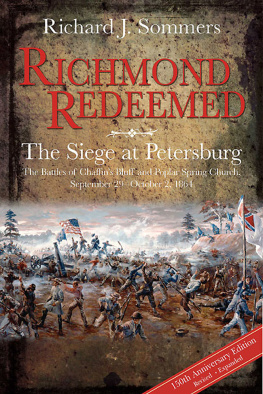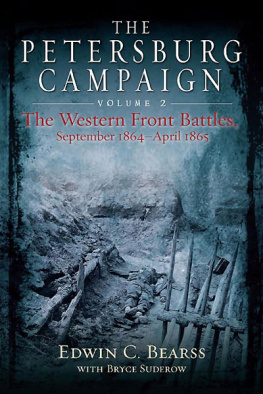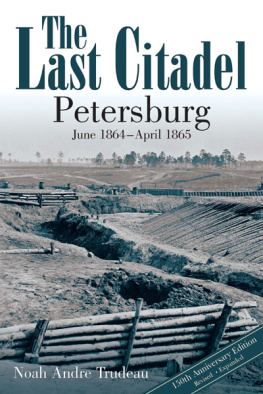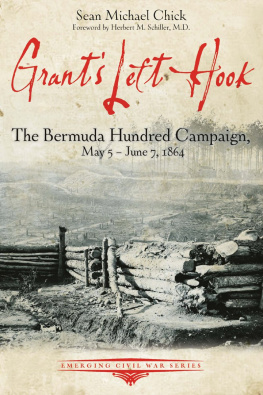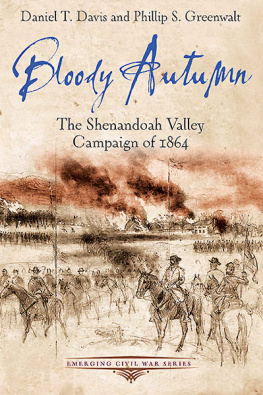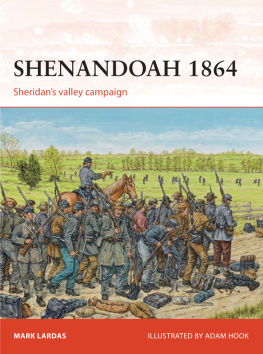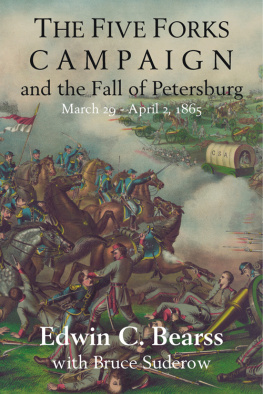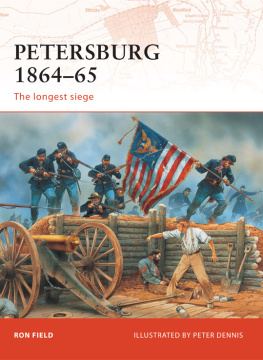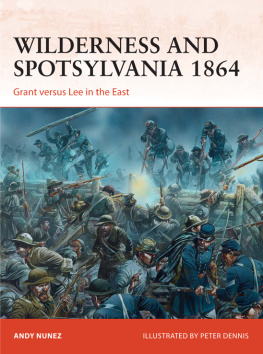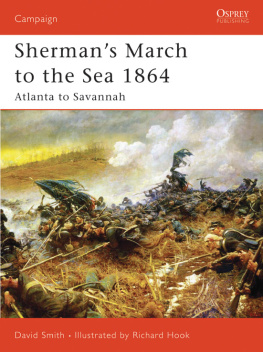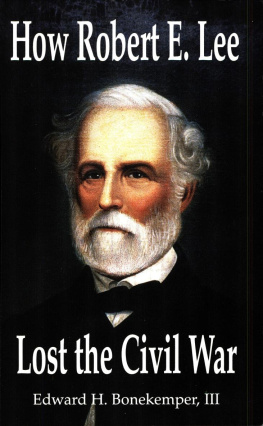Richmond Must Fall
CIVIL WAR SOLDIERS AND STRATEGIES
BRIAN S. WILLS, SERIES EDITOR
Richmond Must Fall: The Richmond-Petersburg Campaign, October 1864
HAMPTON NEWSOME
Richmond Must Fall
The Richmond-Petersburg Campaign,
October 1864
Hampton Newsome
The Kent State University Press
Kent, Ohio
2013 by The Kent State University Press, Kent, Ohio 44242
All rights reserved
Library of Congress Catalog Card Number 2012039124
ISBN 978-1-60635-132-1
Manufactured in the United States of America
Library of Congress Cataloging-in-Publication Data
Newsome, Hampton.
Richmond must fall : the Richmond-Petersburg Campaign, October 1864 / Hampton Newsome.
pages cm (Civil War soldiers and strategies)
Includes bibliographical references and index.
ISBN 978-1-60635-132-1 (hardcover)
1. Petersburg (Va.)HistorySiege, 18641865. 2. Richmond (Va.)HistorySiege,
18641865. 3. Boydton Plank Road, Battle of, Va., 1864. I. Title.
E476.93.N49 2012
973.737dc23
2012039124
17 16 15 14 13 5 4 3 2 1
Contents
From June 1864 to April 1865, Union and Confederate forces endured a grueling campaign outside Richmond and Petersburg. During these eleven months, Ulysses S. Grant sought repeatedly to overwhelm Robert E. Lees defenses and end the Civil War. But Union success on the Richmond-Petersburg front was slow in coming, and events elsewhere dominated headlines during much of the wars final year. Eventually, on April 2, 1865, Grants forces swept over the Confederate trenches southwest of Petersburg, and the next day, both Petersburg and Richmond fell. Over the course of the campaign, Grant conducted no less than nine separate operations to sever vital supply lines or capture these cities outright. This book covers one of the lesser-known periods of the campaign, the military operations of October 1864.
In the fall of 1864, the impending election loomed over Lincolns presidency and promised to dictate the wars ultimate outcome. A Lincoln victory would ensure a continued vigorous Union war effort. Defeat would put George B. McClellan in charge and yield uncertainty by weakening Union resolve and boosting Confederate morale. As the November election approached, cautious optimism buoyed the presidents supporters. Union commanders had achieved notable victories at Atlanta in August and in the Shenandoah Valley in September. But the war was far from over, and little had changed in the crucial military contest at the gates of Richmond and Petersburg.
In the weeks before the election, Grant and Lee did not wait patiently for events elsewhere. On October 7, Lee launched one of his last major offensives of the war. At the Darbytown and New Market Roads east of Richmond, he sought to drive Union forces out of their positions and away from the rebel capital. Lee recognized the brittle nature of Confederate hopes and sought dramatic results in this operation. More than two weeks later, Grant replied with a forty-thousand-man attacking column aimed at seizing the South Side Railroad, the last direct Confederate rail link into Petersburg. In launching this offensive, Grant gambled, thrusting tremendous manpower into harms way a mere two weeks before the presidential election. The operation, Grants sixth offensive of the campaign, would culminate in battles at Burgess Mill south of Petersburg and at the Williamsburg Road east of Richmond. Though the designs conjured by Lee and Grant in October did not yield decisive results, the battles provided important insights into the decision making of these two pivotal leaders. The events also laid the groundwork for operations that would end the war several months later.

This project began over a decade ago as a vague notion and would not have progressed beyond mere aspiration without the generous help of many people. Bryce Suderow, a veteran researcher and writer, helped initiate this effort by sharing sources from his vast collection of material and urging me to dive into the work. At the end of the process, he provided recommendations on the finished product. Lynn Kristianson, of the Arlington Public Library, fielded an endless chain of interlibrary loan requests, locating rare and obscure sources. Linda Miller, archivist at Roanoke College, prepared the index. Others who helped with various research questions and other issues include Richard Sauers, Christopher Calkins, John Anderson, Sandra Burgess and Robert Diehl (descendants of Mary Burgess), Robert Trout, Robert E. L. Krick, Matthew Brown, Louis Manarin, Lance Herdergen, Charles Bowery, Alan Bilger, Michael Gorman, David Mowery, John Horn, John Selby, Roger Skalbeck, Phil Phalen, Walter Veirs, D.J. Peterson, Henry Persons, Gary Laine, James Blankenship, and Robert Rogers. I also would like to thank several individuals who reviewed drafts of the manuscript and provided much-needed contributions. A. Wilson Greene, executive director of Pamplin Historical Park and author of two excellent books related to Civil War Petersburg, prepared extensive comments on an early version of the manuscript, furnishing broad suggestions and identifying specific changes. Robert E. L. Krick, a historian at the Richmond National Battlefield Park, provided feedback grounded in his extensive knowledge of the Henrico battlefields. David Lowe, also a historian with the Park Service as well as editor of Colonel Theodore Lymans invaluable notebooks, eyed a draft and offered helpful insights about the fortifications around Petersburg. Author William Marvel shared his vast knowledge of the war and his well-grounded skepticism of postwar recollections, born from his work on many thoughtful, original books on the conflict. Freelance writer Michael Snyder provided many welcome editorial changes, identified slips in military terminology, and shared observations about Union strategy in 1864. Of course, any errors are my own. Finally, I would like to thank Margot, Jake, and Silas for their endless patience and constant encouragement.

On August 25, 1864, Confederate forces attacked the Union Second Corps at Reams Station, a remote rail stop in southern Virginia. The federal troops, led by General Winfield Hancock, had been engaged in destroying a section of the Weldon Railroad, a key supply line to the Confederate stronghold of Petersburg. Over the summer, the Second Corps had suffered several embarrassing defeats but remained the most respected formation in the Union Army of the Potomac. To halt the Second Corps progress, Confederate infantry and cavalry slipped from their trenches and camps and converged on Reams Station. After several unsuccessful efforts, a late afternoon assault punctured Hancocks position. As men in blue panicked and bolted for the rear, Hancocks entire command began to collapse. The general bellowed into the stampede thundering past him. Come on! he cried. We can beat them yet. Dont leave me, for Gods sake! His exhortations produced little effect. He approached a staff officer manning a nearby battery. With his hand on the mans shoulder, Hancock shouted, Colonel, I do not care to die, but I pray God I may never leave this field! But soon the Confederate wave swept over his disintegrating line. Through the chaos, his officers managed to mend the broken ranks and avoid disaster. But the Confederate victory shamed Hancock and his demoralized command.


